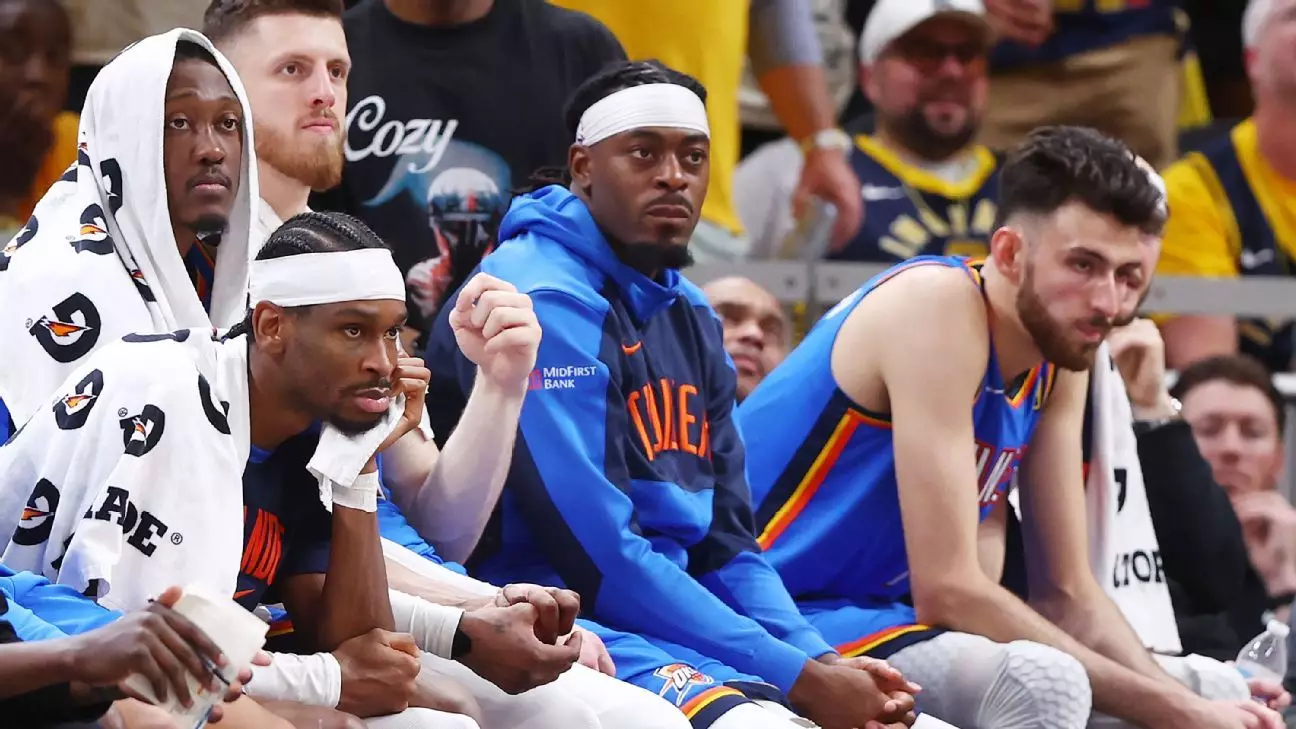In the passionate landscape of sports, expectations soar high, especially when a championship is on the line. The Oklahoma City Thunder, with their star player Shai Gilgeous-Alexander at the helm, had an opportunity to secure their first NBA title since relocating from Seattle. Instead, they fell alarmingly flat against the Indiana Pacers, resulting in a disappointing 108-91 debacle in Game 6 of the NBA Finals. The stark contrast between what fans hoped for and what transpired on the court serves as a jarring reminder of the volatile nature of competition.
Gilgeous-Alexander’s post-game candor was refreshing yet disheartening. The superstar openly admitted, “We sucked tonight.” This moment of frankness was not just a reflection of a bad game but a window into the mindset of a team that had consistently shown promise throughout the season. Their lackluster performance highlighted the pressure that comes with playoff stakes. Whether it was overconfidence or sheer nerves, the game unraveled into a defeat that left the Thunder trembling on the brink of elimination.
Turnovers: The Achilles’ Heel
Every athlete and coach is familiar with the adage that the best teams can take adversity in stride. Yet in this pivotal match, Oklahoma City’s inability to protect the basketball became their Achilles’ heel. With 21 turnovers, including eight from their superstar, the Thunder presented an unsettling trend: a fleeting grasp on the fundamentals that have shaped their ascent to postseason glory. The historical implications of these turnovers are staggering, marking not only a personal low for Gilgeous-Alexander but also a glaring anomaly in the context of the Finals.
Coach Mark Daigneault’s disappointment was palpable. His assertion that the performance was a collective failure rather than an individual misstep resonated powerfully. It raises an important consideration: at what point do individual player dynamics become a team liability? Clearly, the Thunder, a squad touted for their synergy, lost the essence of teamwork in a moment that demanded unity and focus. The Pacers weren’t known for steely defensive pressure, yet they capitalized on Oklahoma City’s disarray, illustrating how a lack of preparation can dismantle even the most gifted rosters.
A Stagnant Offense: The Recipe for Disaster
The statistics from Game 6 reveal more than just turnovers; they uncover a stagnant offensive approach that languished in mediocrity. A shooting percentage of 38.2% and a dismal three-point completion rate of 15% illustrate an offense that was not merely off but insipid. This concerning performance emphasized a greater issue: a breakdown in trust among players that had previously allowed for a fluid system of ball movement and shared responsibility.
Thunder forward Jalen Williams succinctly articulated the essence of their struggle, suggesting that the offense “got sticky.” He highlighted a critical truth about momentum in basketball—the energy and flow can be catalytic for success. Yet against the Pacers, the Thunder’s hesitancy to find the right passes and unselfish play drowned their chances of breaking out of the stagnant offense. Watching the Thunder transition from a quickly moving machine to a halted entity left fans with a sense of bewilderment.
What Lies Ahead: The Urgency of Game 7
As Game 7 looms, the stakes couldn’t be higher for the Thunder. With their championship aspirations hanging in the balance, the team must confront the harsh lessons from Game 6. Gilgeous-Alexander’s somber acknowledgment of their performance rings true: they earned their fate, and if they wish to clinch this coveted title, a profound reset in both mindset and execution is essential.
The looming specter of failure can either serve as a dark cloud or fuel for resurrection. For the Thunder, the challenge is to transform this moment of disappointment into a clarion call for resilience. Their ability to come together as a cohesive unit, learn from their flaws, and renew their defensive intensity will ultimately determine their outcome in the face of adversity. Game 7 stands as a pivotal juncture, one that could either signal the end of dreams or the birth of a champion’s legacy—if they rise to meet it.

Leave a Reply